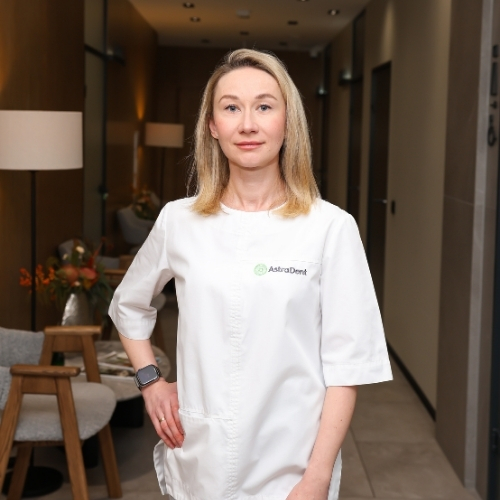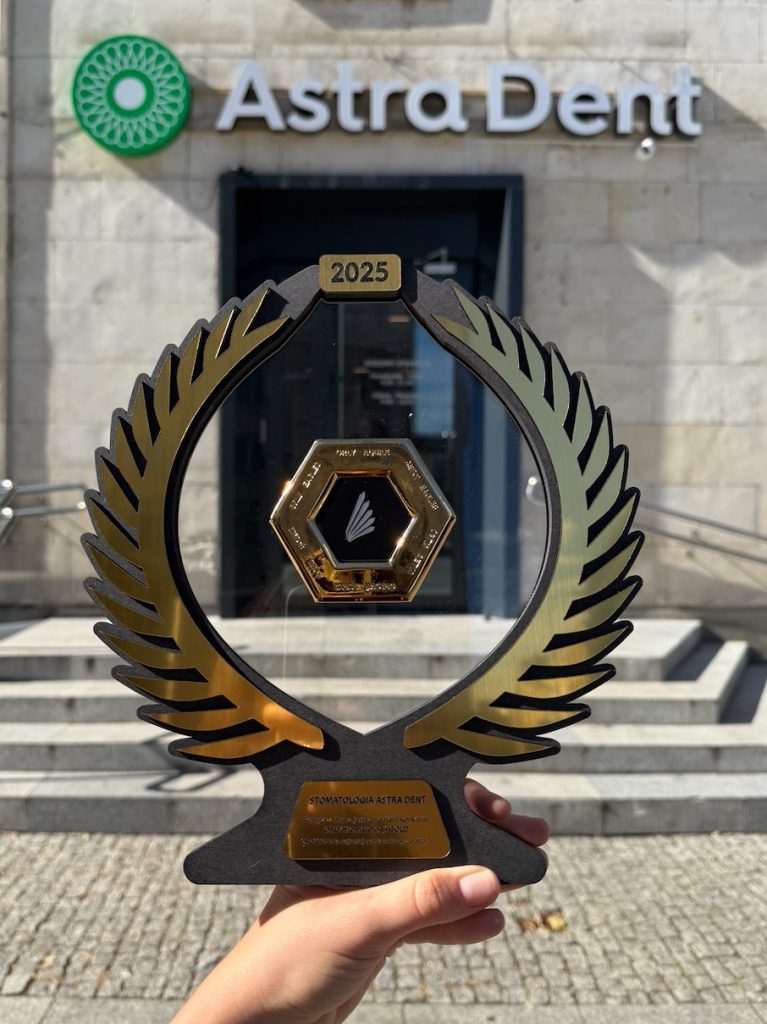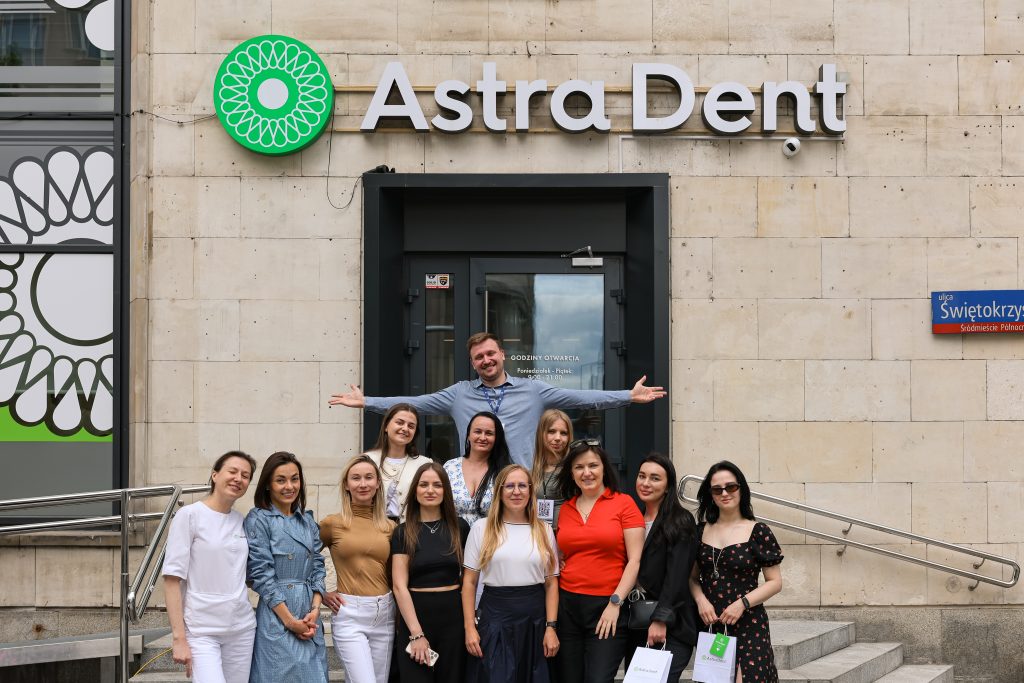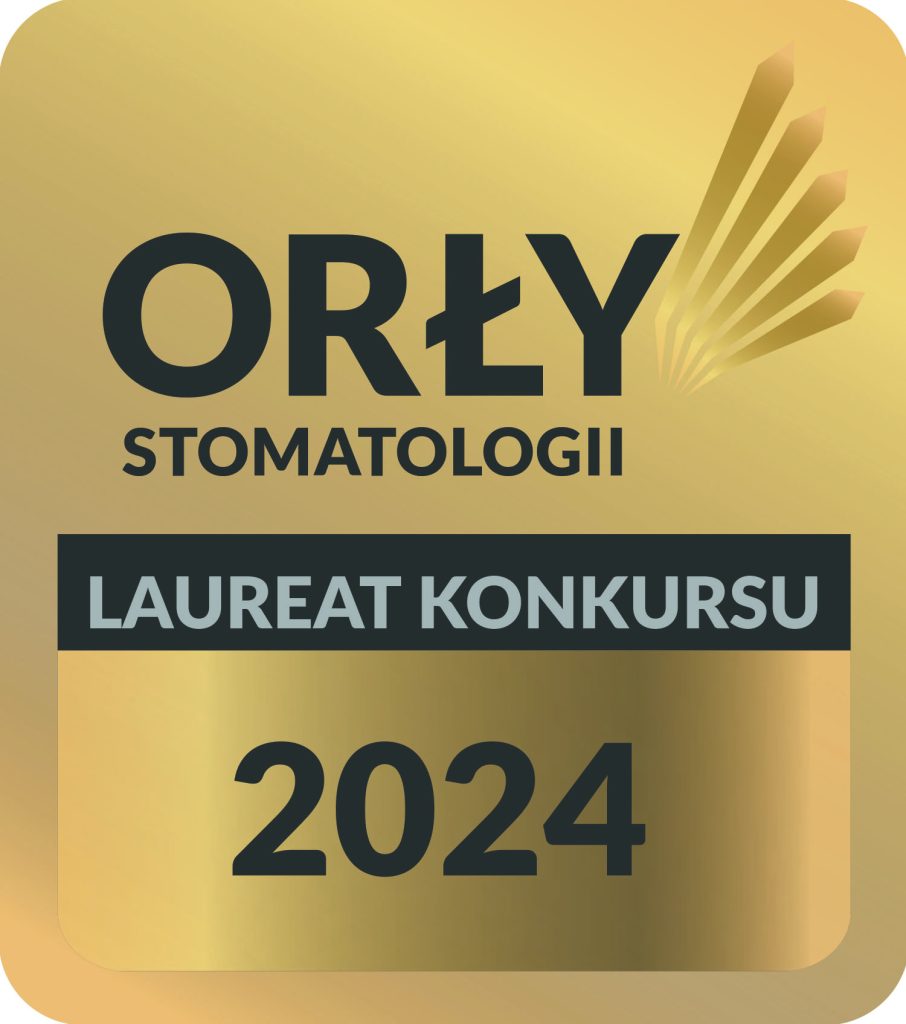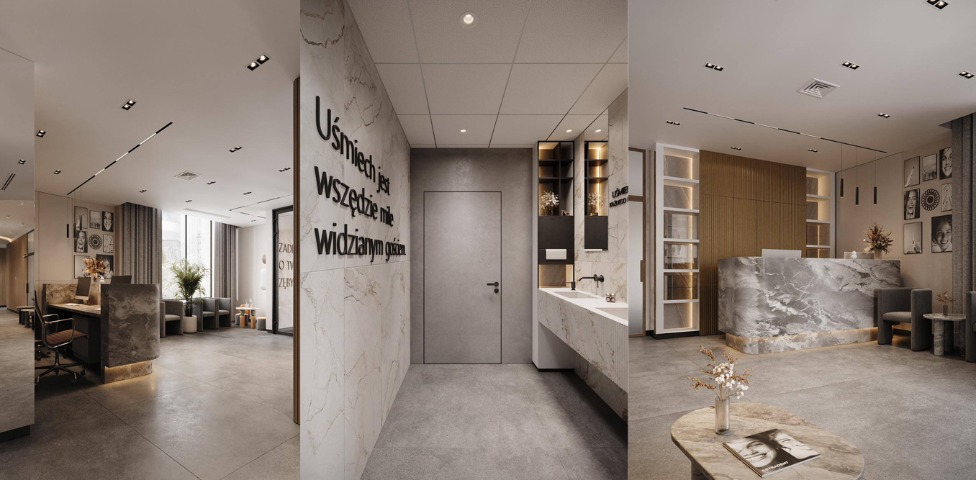satisfied patients
Pediatric dentist consultation
Book a visit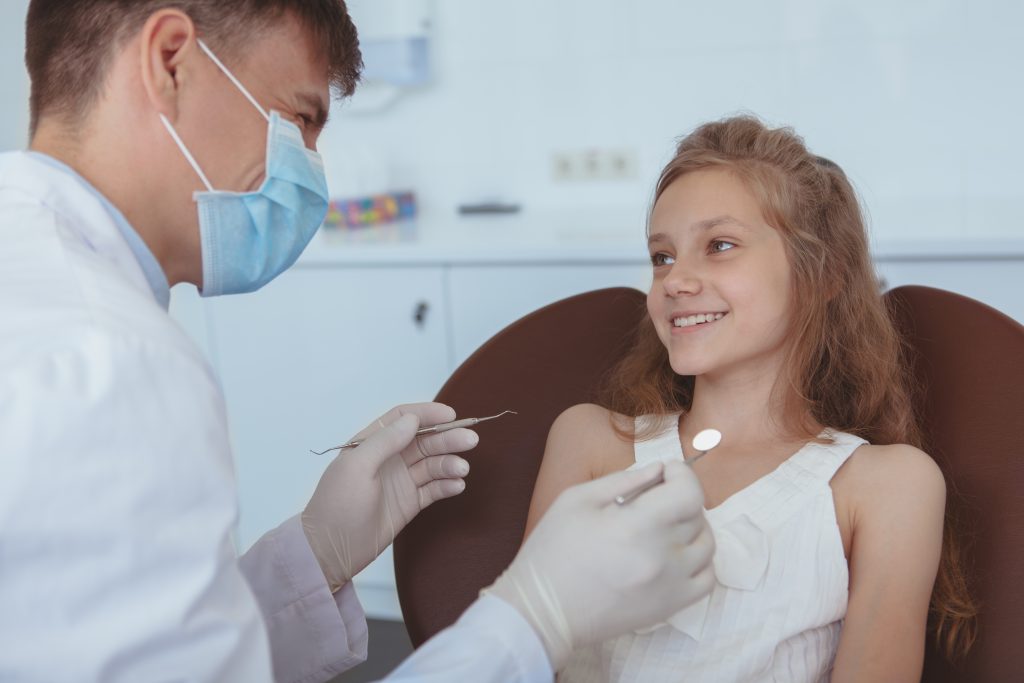
Dental treatment in Warsaw
Our prices
| Pediatric dentist consultation | |
|
Consultation and examination
from 100 zł
|
|
More on procedure
The first visit to the dentist is an important stage in the formation of healthy habits. Children’s teeth have thin enamel, which is quickly destroyed. According to the World Health Organization (WHO), the prevalence of caries of milk teeth in the world is 43%, and in 134 out of 194 WHO member countries the figure exceeds 40%. Preventive examinations from an early age help prevent complications and avoid unpleasant procedures in the future.
Regular visits to the dentist allow us to timely detect the slightest deviations in the formation of teeth, assess the bite, prevent the development of diseases even before the first symptoms appear. Modern diagnostic methods — digital radiography and scanning ± allow us to identify the problem without pain and discomfort. And if necessary, Astra Dent specialists in Warsaw use safe treatment methods that do not cause fear in children.
Early dental care is an investment in health for years to come. A child who gets used to visiting a doctor from an early age is not afraid of the dentist in adulthood, adheres to proper hygiene and keeps healthy teeth for decades. Astra Dent has created all the conditions to make the first experience comfortable — without pain, stress, and tears.
Why do patients choose Astra Dent Warsaw for a consultation with a pediatric dentist?
Choosing a dental center is a question of the quality of treatment and psychological comfort. Children are often afraid of doctors because of a negative experience or fear of the unknown. Astra Dent has taken care of the comfort and painlessness of each visit. From the attentive approach of doctors to modern equipment — every detail works for a positive experience for the child:
- Experienced pediatric dentists with an approach to young patients. Treatment of baby teeth has its own specifics: thin enamel, rapid spread of caries, formation of a correct bite. Astra Dent doctors specialize in pediatric dentistry. They use the “Tell-Show-Do” method — first they tell about the procedure, show the tools and only then they carry out the treatment. This helps to reduce anxiety and inspires trust.
- A child-friendly atmosphere — play areas, cartoons, gifts for the visit. The environment affects the attitude towards treatment. Each child receives a gift after the appointment — stickers, badges or small toys. Thanks to this, a positive association is formed with visits to the dentist, which motivates not to be afraid of subsequent examinations.
- Painless diagnostics and treatment using modern technologies. Fear of pain is the main reason why children do not like dentists. Astra Dent specialists use computer anesthesia STA (The Wand) without using a traditional syringe. It provides accurate dosing and painless administration.
- Communication in Ukrainian for comfortable communication. For many Ukrainian families in Warsaw, communication in their native language is important. Astra Dent employs Ukrainian-speaking dentists and administrators who will help the child feel confident. Parents receive clear explanations of diagnosis, treatment methods and dental care recommendations without a language barrier.
Every visit to a pediatric dentist is a lifelong investment in dental health. Astra Dent makes the process easy, painless, and even enjoyable.
When should you take your child to the dentist?
Regular visits to the dentist are the key to healthy teeth in the future. The earlier a child gets to know the dentist, the less fear they will have of treatment. Parents often postpone their first visit to the dentist’s office until problems arise, but this is wrong. It is important to start prevention before the first symptoms of caries or discomfort appear.
First visit – at what age?
According to the recommendations of the World Health Organization (WHO) and the American Academy of Pediatric Dentistry (AAPD), the first visit to the dentist should take place no later than 12 months. This is due to the fact that:
- baby teeth are covered with loose enamel, which is more easily destroyed by bacteria;
- caries in children develops rapidly, and even a small spot can turn into a big problem in a few months;
- timely diagnosis prevents malocclusion – a specialist will assess the development of the jaw and give recommendations for proper care.
The first visit is an examination, meeting with the doctor and a consultation for parents. Treatment at this stage is usually not carried out if there are no obvious problems.
Preventive examinations every 6 months
Prevention is more effective than therapy. The optimal interval between examinations is once every 6 months. It is with this frequency that you can:
- detect the initial stages of caries before fillings are required;
- monitor the change of baby teeth and the development of a permanent bite;
- perform preventive fluoride coating to strengthen enamel.
In children with an increased risk of dental diseases (for example, with weak enamel or a hereditary predisposition), examinations may be more frequent – once every 3-4 months.
Symptoms when consultation is needed immediately
Do not wait for a scheduled appointment if symptoms appear that indicate problems with the teeth or gums. An immediate visit to the dentist is needed if:
- The child complains of pain. Even minor discomfort can signal caries or inflammation.
- Bad breath has appeared that does not disappear after brushing the teeth. This may be a sign of infection or improper care.
- The color of the tooth has changed. The appearance of dark spots or yellow plaque indicates caries or demineralization of the enamel.
- The gums are swollen or bleeding. Gingivitis or another inflammatory process may begin.
Timely consultation with a dentist helps to avoid complications and surgical intervention. Astra Dent offers modern methods of diagnosis and painless treatment that help to quickly solve the problem and make the visit comfortable for the child.
What is included in a pediatric dentist consultation?
A pediatric dentist consultation involves getting to know the doctor, assessing the condition of the oral cavity, preventive recommendations and a treatment plan if necessary. The first visit is especially important, as it determines the attitude towards future visits to the dentist.
Getting to know the doctor and the child’s adaptation
Many children are afraid of doctors because of the fear of pain. Astra Dent specialists in Warsaw use the “Tell-Show-Do” method:
- tell — explain to the child what they will do in simple and understandable words;
- show — demonstrate tools and procedures, for example, allow them to hold a small mirror, press a button on a contactless device for drying teeth;
- do — gradually move on to an examination and simple manipulations without pain.
During the appointment, children watch cartoons or can take their favorite toy. This reduces stress and builds a trustworthy attitude to the doctor.
Examination of teeth, gums and bite
The dentist diagnoses the condition of the oral cavity, paying attention to:
- caries and enamel demineralization — detects early stages of tooth decay;
- inflammatory processes — assesses the condition of the gums, checks for bleeding or swelling;
- bite formation — analyzes whether there is a risk of future orthodontic problems.
If necessary, additional diagnostics are prescribed: laser caries scanning DIAGNOdent or digital X-ray to detect hidden problems.
Tips on hygiene and nutrition
Proper dental care begins at home. The doctor explains the basic rules to the child and parents:
- how to brush the teeth properly (duration, technique, choice of brush and toothpaste);
- which products strengthen enamel and which increase the risk of caries;
- why it is important to limit sweets and carbonated drinks;
- how to prevent bad habits (thumb sucking, nail-biting, etc.).
Following the recommendations helps maintain dental health and reduce the risk of caries and inflammatory processes in the oral cavity.
Treatment plan if necessary
If the doctor detects problems during the examination, an individual treatment plan is developed. This may include:
- enamel remineralization — strengthening the teeth with fluoride or calcium-containing preparations;
- fissure sealing — applying a special material to the chewing surfaces of the teeth to protect against bacteria;
- treatment of caries — if the lesion is already progressing, modern fillings that match the color of the teeth are used.
Timely referral to specialists reduces discomfort during the visit, since many procedures can be performed without drilling and injections.
Answers to parents’ questions
At the end of the consultation, the dentist answers all the parents’ questions:
- is it necessary to align the bite;
- how often to come for check-ups;
- is it possible to use an electric toothbrush at an early age;
- what additional preventive measures are needed for this particular child.
A consultation at Astra Dent is a comprehensive care for children’s dental health. It is a comfortable process in which dentists do everything possible so that children are not afraid of treatment and come to the appointment with a smile.
How to prepare your child for the first visit?
The first visit to the dentist largely determines the child’s future attitude towards dental treatment. If it goes well, the child will not be afraid of subsequent examinations. The main task of parents is to create a positive mood and explain what to expect from the appointment.
Choose the right time for the visit
It is difficult for a child to adapt to a new environment if they feel tired or hungry. It is best to make an appointment in the morning, when they are rested and in a good mood. It is important that the day of the visit does not coincide with other stressful events, for example, vaccinations, classes in kindergarten or school.
Explain what will happen
Talk about the dentist in a positive way. Avoid the words “painful”, “injection”, “scary”. Instead, use phrases:
- “the doctor will look at how your teeth grow”;
- “they will show you interesting tools and a mirror”;
- “together we will learn how to make your teeth even stronger”.
Books and cartoons about dentists work well. It will be easier for a child if he understands in advance what is happening in the dental office.
Avoid your own fears
If parents themselves are afraid of dentists, the child may adopt this fear. You should not talk about your own negative experience, say something like: “Don’t be afraid, it won’t hurt” – such a phrase will cause anxiety. It is important to remain calm and confident, showing that a visit to the doctor is a normal part of health care.
Take a favorite toy with you
A familiar thing will help relieve tension. Astra Dent doctors allow children to hold their favorite toy during the examination or even “treat” their teeth together with the dentist. This creates a friendly atmosphere and helps the little patient feel confident.
Encourage, but do not bribe
After the visit, be sure to praise the child, regardless of how he behaved. This will consolidate the positive experience and reduce fear of future appointments. However, you should not promise gifts or sweets “in exchange” for behavior. Such an approach raises suspicions that the visit is really connected with something unpleasant.
How to make an appointment?
Do not postpone a visit to a pediatric dentist. A consultation at Astra Dent in Warsaw is comfortable, painless and with an individual approach to the little patient. You can make an appointment in a convenient way:
- by filling out the online form on the website astradent.pl;
- by sending a request to email: info@astradent.pl;
- by calling +48 533 599 552.
The dental center is waiting for you with specialists with over 10 years of experience, modern treatment methods and a cozy atmosphere that helps you feel calm. The appointment is carried out exclusively by prior appointment, which guarantees high-quality service without haste.
Why do patients trust Astra Dent doctors?
years of successful experience in dentistry
newest equipment for treatment and diagnostics
minute walk from Świętokrzyska metro station
Best doctors
We employ only highly qualified doctors. Astra Dent dentists regularly attend professional workshops and internships in Poland and abroad.
All doctorsFAQ
| Should a child brush their teeth if they have just started to erupt? | |
|
Yes, care is mandatory with the appearance of the first tooth. Use special silicone fingertips or a soft brush for babies. |
|
| Can you use fluoridated toothpaste for children? | |
|
Yes, but with restrictions. For children under 3 years old, the toothpaste should contain no more than 1000 ppm of fluoride, and from 3 to 6 years old – from 1000 to 1450 ppm. |
|
| How do you know that a child has weak enamel? | |
|
If the teeth turn yellow quickly, white or brown spots appear on them, and the child complains of sensitivity to cold or hot – these are signs of enamel demineralization. |
|
| Is it true that caries in children can be transmitted from parents? | |
|
Yes, the bacteria that cause caries (Streptococcus mutans) can be transmitted through spoons, pacifiers or even kisses on the lips. Therefore, it is important for parents to also monitor their dental health. |
|
| How often should a child's tongue be cleaned? | |
|
The tongue should be cleaned every time you brush your teeth, as bacteria accumulate on it, which contribute to bad breath and the development of caries. You can use a brush or a special scraper to do this. |
|
| What is fissure sealing and is it necessary for children? | |
|
Fissure sealing is the application of a special protective material to the chewing surfaces of the teeth. This prevents the accumulation of bacteria in the deep grooves, where caries most often develops. It is recommended for children from 6 years old, when the first permanent molars erupt. |
|
Hot deals

Specialist Consultation + CT Scan for 349 zł
Time to take care of your smile
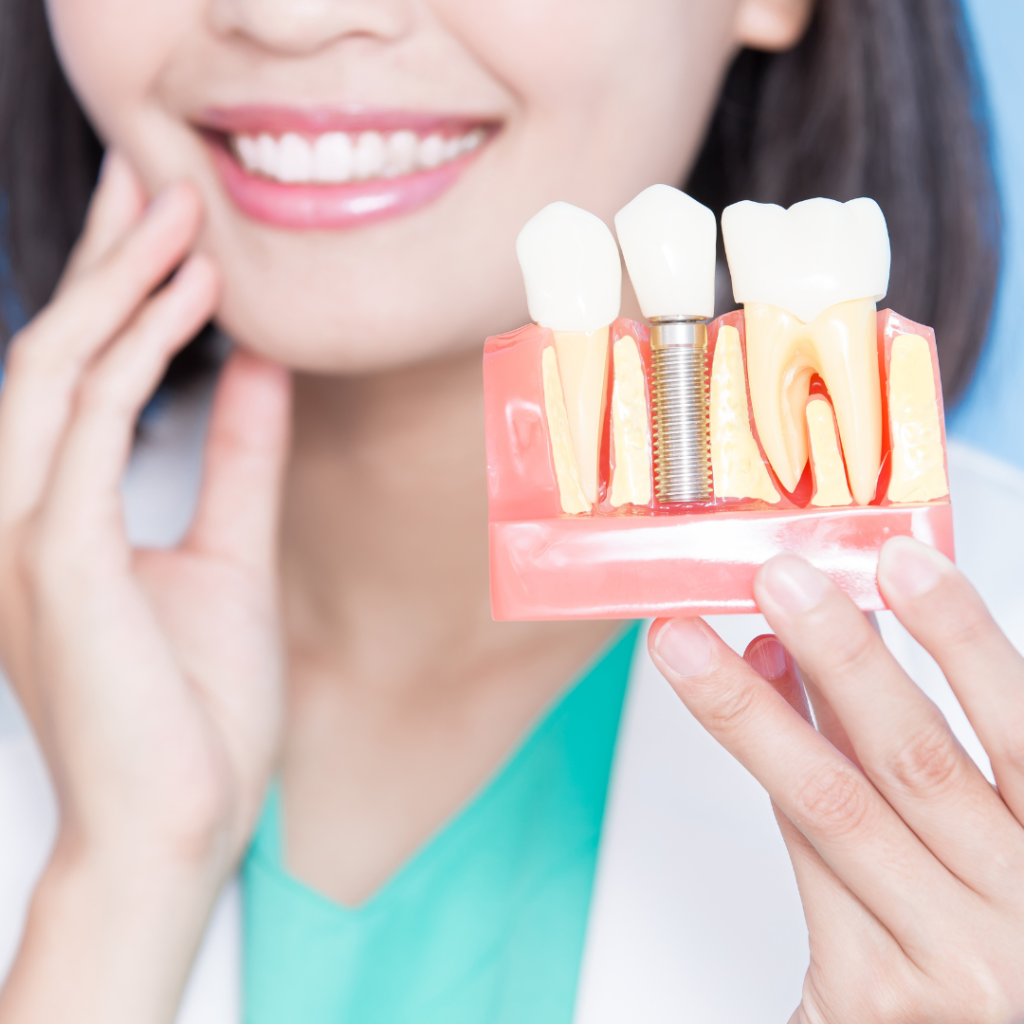
Implant Megagen for 2500 zł only
This solution provides durability, comfort, and a natural look, allowing you to enjoy everyday comfort.

Professional Dental Cleaning 4in1 + Check-up for 350 zł
The beginning of a new year is the perfect time to focus on your health and build good habits.

Surgical and implantology consultation with CT for PLN 350!
The special offer for PLN 350 is valid until July 31, 2025.
